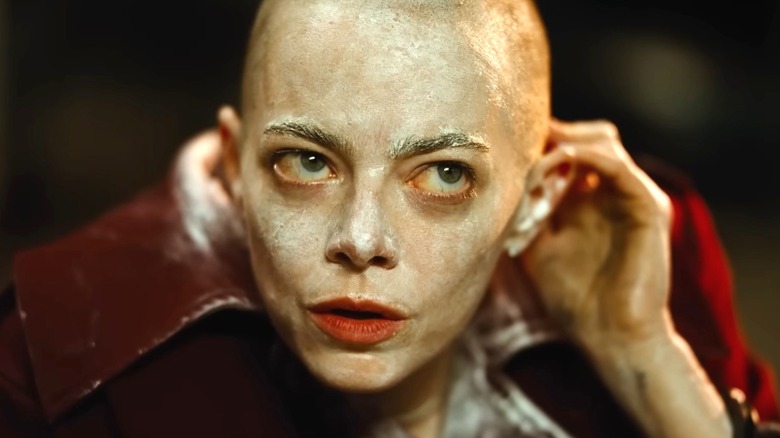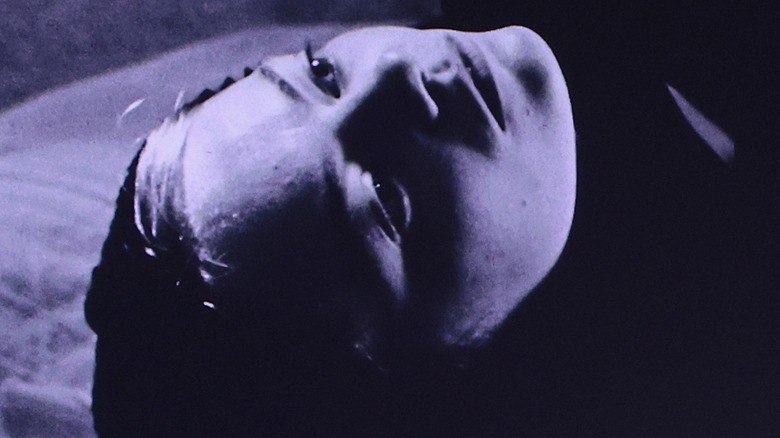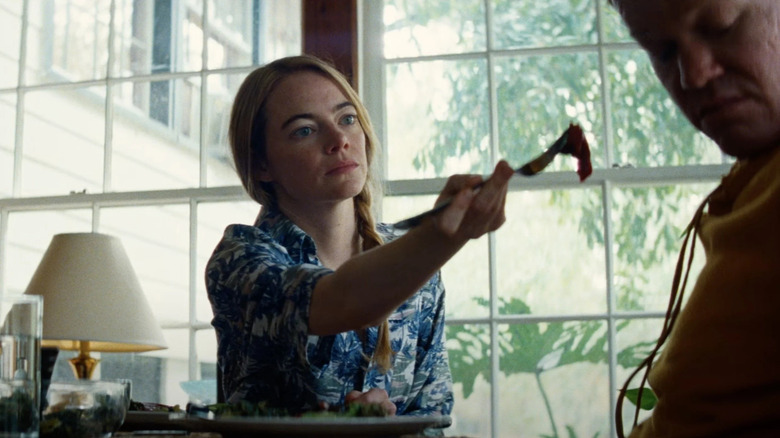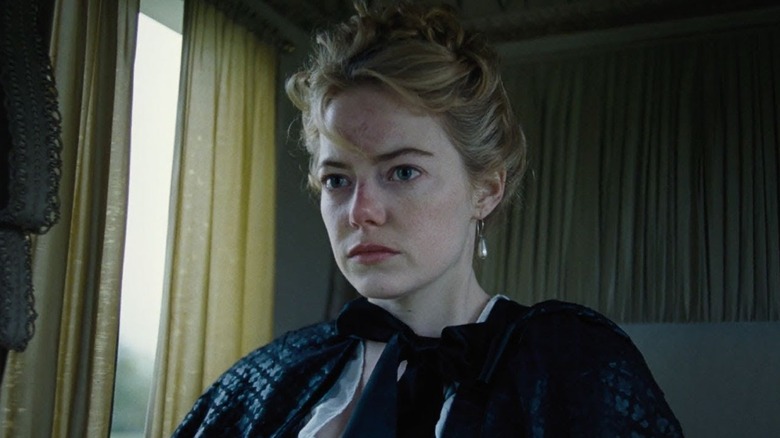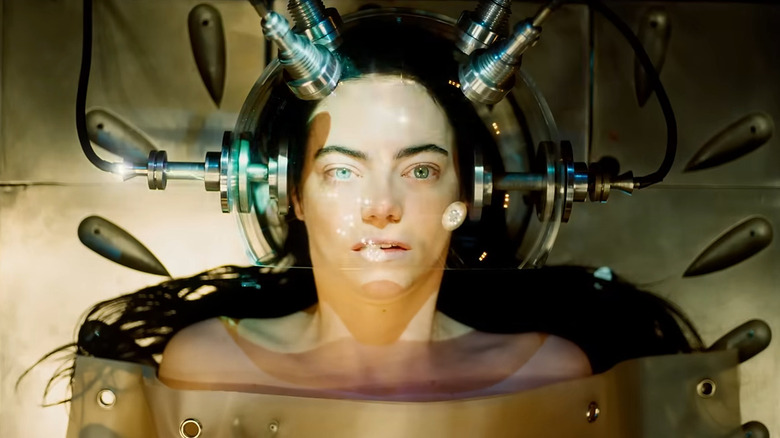Every Emma Stone And Yorgos Lanthimos Movie, Ranked
A truly magical thing happens when a filmmaker stumbles upon a performer who fundamentally understands their material, resulting in a fruitful professional partnership. It's about time that Yorgos Lanthimos and Emma Stone were added to the list of the best director-actor pairs in movie history. They have worked together numerous times and brought us some brilliant films — and, hopefully, there's a lot more in store for the duo.
It's clear that Lanthimos and Stone have similar creative sensibilities. Lanthimos' films often take a darkly comedic look at the world. He's interested in existential questions filtered through a lens of absurdism. His films ask questions about the way people treat one another and what it means to be in love. While she's a multifaceted performer, Emma Stone got her start with comedies like "Superbad." She understands comedic timing, yet she's more than capable of nailing the dramatic aspects of Lanthimos' characters.
As of this writing, Stone and Lanthimos have worked together on five projects: four feature-length movies and one short film. You're not going to regret watching any of them, but if you're curious about how to manage expectations, we've ranked them all from worst to best.
5. Bleat
Many directors get their start with short films, but after Yorgos Lanthimos was already an established name, and after working with Emma Stone for the first time with "The Favourite," the filmmaker embarked on the ambitious "Bleat." It's a 30-minute short set in Lanthimos' home country of Greece (on the island of Tenos, to be exact) starring Stone as a mourning woman facing a surrealist journey through her imagination.
This modern black and white film, which has only had a few select screenings, doesn't contain any dialogue and is meant to be accompanied by a live orchestra. Lanthimos has emphatically stated that he will only present the film the way it's meant to be seen, so don't expect it to drop on Netflix anytime soon. Those who have been lucky enough to see it have sung the short's praises. But since it's virtually inaccessible, it has to rank last on this list.
4. Kinds of Kindness
Yorgos Lanthimos' movies aren't for everyone, but if you don't mind descending into the depths of human depravity, there's not necessarily a bad one in the bunch. "Kinds of Kindness" ranks lower, but it's still a fascinating experiment, as Lanthimos presents an anthology film comprising three parts. The first follows a man who has every aspect of his life dictated by his boss. The second involves a man being reunited with his wife after she gets lost at sea and subsequently rescued. And the third sees two cult members trying to recruit a young girl with the supposed power to resurrect the dead.
The lead characters in all three tales are played by Emma Stone and Jesse Plemons, who work wonderfully well together. The supporting cast also bring their A-games, with great turns from Willem Dafoe, Margaret Qualley, and Hong Chau across every installment. It's three films for the price of one, with each exploring a different theme in a darkly funny way, whether it's how obsession can lead people to do awful things or how people are willing to sacrifice freedom for a bizarre sense of comfort.
Stone portrays three very different characters equally well. As Liz, she offers a nuanced look at a woman seemingly trying to hide something, while Emily is far more extroverted, and she's the one who gets the famous dance scene that blew up online following the trailer release. "Kinds of Kindness" is basically an excuse for Lanthimos to work with actors previously in his repertoire and just let loose, so if you're down for a wild ride, it'll take you on an odyssey.
3. Bugonia
If there's any filmmaker alive today equipped to handle the sheer absurdity and terrifying reality of how conspiracy theories have infiltrated the minds of so many, it's Yorgos Lanthimos. He demonstrates this with aplomb in "Bugonia," his latest Emma Stone collaboration. The film follows two cousins, Teddy (Jesse Plemons) and Don (Aidan Delbis), who kidnap powerful CEO Michelle Fuller (Stone) because they believe she's an alien causing much suffering in the world and they want an audience with her superiors.
Many scenes involve Stone and Plemons going back and forth, and it's thrilling to watch the power dynamics change. At some points it feels like Teddy's in charge, then the pendulum swings and Michelle gains an upper hand. The big takeaway is that the two simply can't get through to one another because their worldviews are so drastically different. How can one hope to engage in good faith conversations when they can't even agree on basic facts? It's the question of the moment happening all over the world right now.
"Bugonia" makes it clear that Lanthimos and Stone understand each other thoroughly at this point in their professional relationship. Stone is attuned to the comedic absurdity of the character and situations, as her robotic speech patterns — reminiscent of so many in the tech world — make the audience think there's something not quite human about her. The way she delivers certain lines so awkwardly is simultaneously hilarious and kind of frightening. It's chilling to think about how much more relevant "Bugonia" might become in the coming years.
2. The Favourite
At first glance, "The Favourite" may seem like a stark departure from most of Yorgos Lanthimos' work. That's because it's a period piece (one of the best period movies ever made, in fact) about royalty. The absurdity isn't readily apparent in "The Favourite," in which the affections of Queen Anne (Olivia Colman) in the 18th century are fought over by the staunchly loyal Sarah Churchill (Rachel Weisz) and social climber Abigail Hill (Emma Stone). It marks the first time Stone would appear in a Lanthimos movie, kickstarting one of the most exciting partnerships in recent Hollywood memory.
"The Favourite" explores themes that have become commonplace in Lanthimos' filmography. It's all about power balances, and specifically how these two women use their sexuality and various levels of manipulation to curry favor with the Queen. As it relates to Abigail, she's an outsider who feels like she deserves royal status, something she was denied due to her father's ineptitude. Stone brings a layered performance that's simultaneously funny (she needs to court favor and appear pleasant, after all) and ambitious. There's a darkness within her that bubbles to the surface whenever she comes into contention with Sarah.
It's a testament to Stone's acting ability that, early in the film, we're very much rooting for her to reach her goal. As the film goes on, we see the darkness lying in her soul, and her presence has made everyone's lives worse. Her performance jettisons between naïve hero and sinister villain, making it one of Emma Stone's best movie performances to date.
1. Poor Things
"Poor Things" is a stunning achievement for both Yorgos Lanthimos and Emma Stone. It represents the apex of a filmmaker having the utmost trust in a performer to deliver with a daring role, and that's precisely what Stone does with Bella Baxter, a woman brought back to life with the mind of a baby. At first, she struggles to walk and speak; it's the kind of part that could easily come across as ridiculous if the wrong actor was in the role. Yes, it's meant to be funny to a degree, but Stone fleshes out Bella as the film goes on. The way she walks subtly changes as the film progresses, as she begins to express herself more confidently.
As Bella explores more of the world, she witnesses its horrors and explores her own sexuality. She becomes worldly and aware of the abuses of power so often at play. "Poor Things" is a movie that only works when you have a performer at the helm who can sell both the comedy and tragedy of a complete outsider questioning gender and social norms. When you break down such cycles from the perspective of someone who's essentially a child, things quickly dissolve into nonsense with no good explanation for why we should adhere to the status quo when it's filled with absurdity.
Stone won the Oscar for best actress in a leading role for her absorbing work in "Poor Things," and rightfully so. It's impossible to know how much came from her own personal preparation and how much she got from Lanthimos' direction. Either way, "Poor Things" represents this perfect blending of sensibilities where an actor has total trust in her director and vice versa. "Poor Things" is essentially a feminist take on the Frankenstein story, and Emma Stone is frighteningly good in the lead role.
